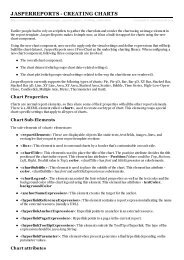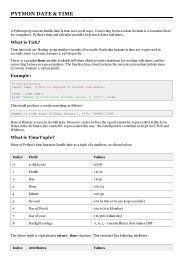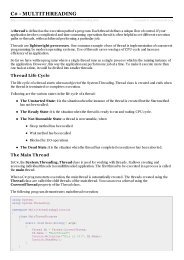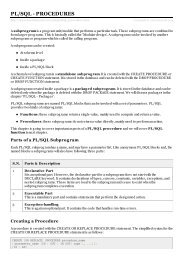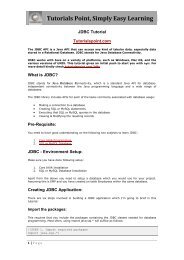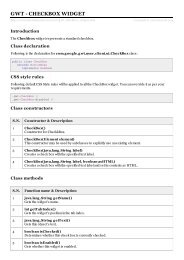Download Scala Tutorial (PDF Version) - Tutorials Point
Download Scala Tutorial (PDF Version) - Tutorials Point
Download Scala Tutorial (PDF Version) - Tutorials Point
Create successful ePaper yourself
Turn your PDF publications into a flip-book with our unique Google optimized e-Paper software.
<strong>Scala</strong> supports first-class functions, which means you can express functions in function literal syntax, i.e., (x: Int)<br />
=> x + 1, and that functions can be represented by objects, which are called function values. The following<br />
expression creates a successor function for integers:<br />
var inc = (x:Int) => x+1<br />
Variable inc is now a function that can be used the usual way:<br />
var x = inc(7)-1<br />
It is also possible to define functions with multiple parameters as follows:<br />
var mul = (x: Int, y: Int) => x*y<br />
Variable mul is now a function that can be used the usual way:<br />
println(mul(3, 4))<br />
It is also possible to define functions with no parameter as follows:<br />
var userDir = () => { System.getProperty("user.dir") }<br />
Variable userDir is now a function that can be used the usual way:<br />
println( userDir )<br />
Partially Applied Functions<br />
When you invoke a function, you're said to be applying the function to the arguments. If you pass all the expected<br />
arguments, you have fully applied it. If you send only a few arguments, then you get back a partially applied<br />
function. This gives you the convenience of binding some arguments and leaving the rest to be filled in later.<br />
Following is a simple example to show the concept:<br />
import java.util.Date<br />
object Test {<br />
def main(args: Array[String]) {<br />
val date = new Date<br />
log(date, "message1" )<br />
log(date, "message2" )<br />
log(date, "message3" )<br />
}<br />
}<br />
def log(date: Date, message: String) = {<br />
println(date + "----" + message)<br />
}<br />
Here, the log( ) method takes two parameters: date and message. We want to invoke the method multiple times,<br />
with the same value for date but different values for message. We can eliminate the noise of passing the date to<br />
each call by partially applying that argument to the log( ) method. To do so, we first bind a value to the date<br />
parameter and leave the second parameter unbound by putting an underscore at its place. The result is a partially<br />
applied function that we've stored in a variable. We can now invoke this new method with only the unbound<br />
argument message as follows:<br />
import java.util.Date<br />
object Test {<br />
def main(args: Array[String]) {<br />
val logWithDateBound = log(new Date, _ : String)<br />
TUTORIALS POINT<br />
Simply Easy Learning



